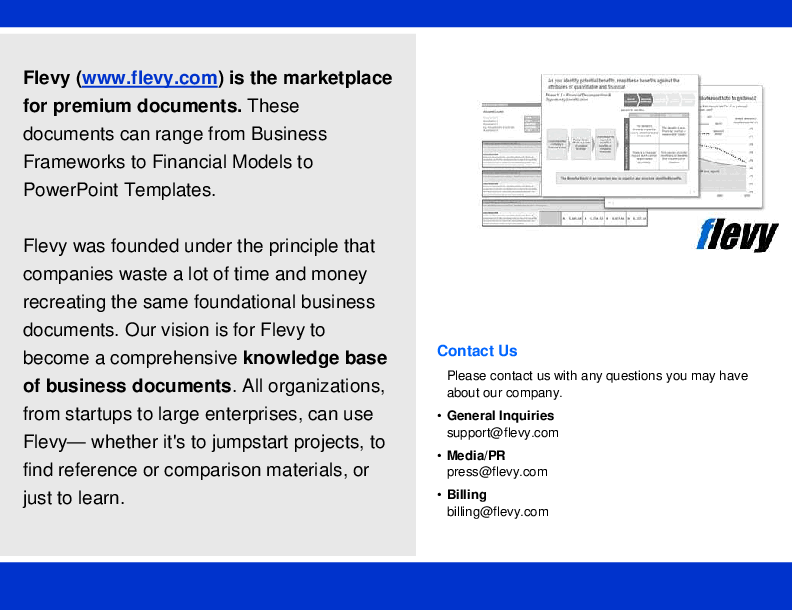Build-Measure-Learn Process Poster (PDF)
PDF document + PowerPoint (PPTX) 5 Pages
BENEFITS OF THIS PDF DOCUMENT
- Serves as a visual reference, making it easier for teams to grasp and apply the Lean Startup methodology's iterative process.
- Promotes team alignment, ensuring everyone shares a common understanding of the methodology and its key phases.
- Provides a constant reminder of the process, encouraging a culture of data-driven decision-making and iterative improvement within the organization.
LEAN STARTUP PDF DESCRIPTION
The Build-Measure-Learn process is a fundamental concept within the Lean Startup methodology, developed by Eric Ries. It represents an iterative and systematic approach to developing and growing a startup or innovative project. This process prioritizes rapid experimentation, data-driven decision-making, and continuous validation of hypotheses. It consists of three interconnected phases: Build, Measure, and Learn.
Benefits:
• Efficiency: The Build-Measure-Learn process encourages the creation of a Minimum Viable Product (MVP), which helps startups avoid building elaborate products or services that may not find a market fit. This efficiency conserves resources and minimizes waste.
• Risk Mitigation: By releasing an MVP and gathering real-world data early in the development process, startups can identify and address issues, reducing the risk of investing significant time and resources into an unviable idea.
• Customer-Centricity: This process places a strong emphasis on understanding customer needs and behaviors. By continuously collecting and analyzing data, startups can tailor their products or strategies to meet customer expectations more effectively.
• Iterative Improvement: The iterative nature of Build-Measure-Learn allows for rapid adjustments and refinements based on feedback and insights. Startups can pivot (make significant changes) or persevere (build upon what works) with greater confidence.
• Innovation: It fosters a culture of innovation and experimentation within the organization, as teams are encouraged to explore new ideas and adapt to changing market conditions.
Applications:
• Startups: The Build-Measure-Learn process is most commonly associated with early-stage startups. It helps them test their business models, product ideas, and market assumptions in a systematic and efficient manner.
• Product Development: Established companies can also apply this process when developing new products or features. It ensures that resources are invested wisely and that products align with customer needs.
• Project Management: Beyond startups, the Build-Measure-Learn approach can be used in various project management scenarios, enabling teams to experiment, gather data, and adapt their strategies for better outcomes.
• Continuous Improvement: Even in non-startup contexts, the Build-Measure-Learn process can foster a culture of continuous improvement by encouraging teams to learn from their actions and make data-driven decisions.
The Build-Measure-Learn process is a powerful framework for innovation and entrepreneurship. It empowers organizations to build products and services that customers truly value while minimizing risks and resource wastage. By iterating through these phases, companies can adapt to changing market conditions, optimize their strategies, and increase their chances of long-term success.
The Build-Measure-Learn Process poster is available in two distinct themes: a vibrant color scheme and a professional monochrome version. In both formats, the poster comes in a convenient PDF as well as an editable PPTX format, enabling effortless printing on A3/A4-sized paper from standard office copier machines. This versatile resource can be prominently displayed on employee workstations or distributed alongside your Lean Startup training materials.
Furthermore, the Build-Measure-Learn Process poster is an ideal supplement to Lean Startup-related training presentations. It serves as a valuable takeaway, summarizing the core principles of Lean Startup reinforcing the key takeaways from your training.
Got a question about the product? Email us at support@flevy.com or ask the author directly by using the "Ask the Author a Question" form. If you cannot view the preview above this document description, go here to view the large preview instead.
Source: Best Practices in Lean Startup PDF: Build-Measure-Learn Process Poster PDF (PDF) Document, Operational Excellence Consulting




